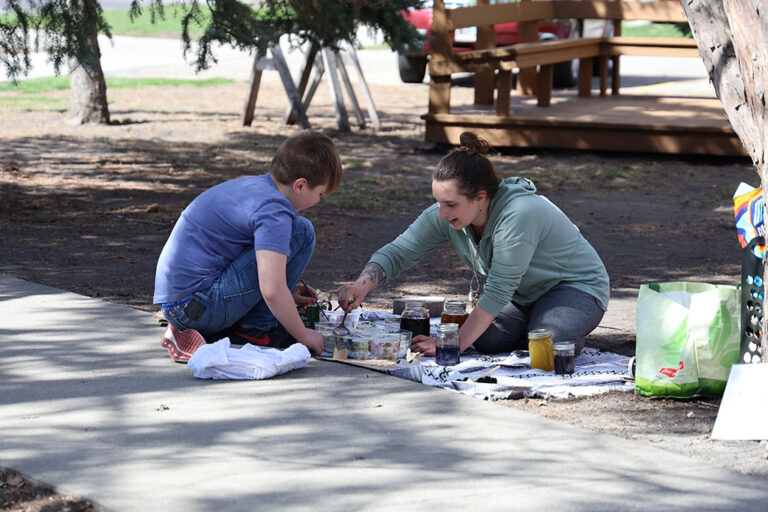‘Congratulations, Doctor’
With her successful defense of her dissertation at UND, Elizabeth Luger joins the ‘Long Robed Line’ of doctoral degree holders worldwide

On the last Monday morning of November, Elizabeth Luger felt anxious.
In a conference room on the second floor of the University of North Dakota’s Columbia Hall, furnished with little else but chairs tucked around a long table, she busied uploading a presentation onto a large screen.
Across the room, chatting quietly, sat her husband and daughter, there to support Luger in one of the most seminal and memorable moments of a Ph.D. candidate’s academic life – the dissertation defense.
“I was nervous because I was thinking not only about my research and trying to remember all of it, which spans back years,” said Luger, “but I was also nervous about maybe being stumped at the end with different questions.”
The end, though, was still about an hour away. The five faculty members on Luger’s defense committee filed into the conference room, bringing coffee mugs and offering friendly “good morning” and “how are you doing.”
Moments after 9 a.m., Luger’s advisor, Justin Douglas “Doug” McDonald, head of the UND’s INPSYDE or Indians into Psychology Doctoral Education program (where Luger is a scholar) and professor in clinical psychology, stood up to welcome everyone.
With a smile and a sliver of apprehension in her voice, Luger, a Ph.D. candidate in clinical psychology, took over the gathering.
The long history of dissertation defenses
While their format may slightly differ depending on the discipline, dissertation defenses present a rite of passage in academe. Ideally centered on a rigorous research discussion, they are that often nerve-wracking, transitional time between being a Ph.D. candidate and a Ph.D. holder.
“Researching, writing, and defending the dissertation is truly a once-in-a-lifetime experience; the sheer amount of time, work, personal sacrifice, yet also personal and professional fulfillment that produces a quality dissertation cannot be overstated,” said Chris Nelson, associate dean of UND Graduate School.
In fact, the practice of defending one’s dissertation is older than the country itself. The general optics of defenses — a student presenting his or her research in front of a faculty committee and the interested public — stem from early-19th-century Germany, when Latin was the language of the occasion.
Today, dissertation defenses in the U.S. are devoid of much of the pomp that once surrounded them, such as wearing academic dress. Yet, that does not make them any less remarkable of an academic milestone for students, their faculty and family.
“I congratulate and celebrate Dr. Luger for her hard work in joining the less than 2 percent of the U.S. population that holds a doctorate,” said Nelson. “She has not only successfully navigated the intensive professional training experience that the dissertation represents, but also made an important and original contribution to scholarship whose larger cultural significance is clear and compelling.”
A background of inspiration
“For my research,” Luger said to her committee, “I was interested in looking at historical trauma and the impact of historical trauma on alcohol use and the academic outcomes of [Native] college students.”
That line of inquiry stems from Luger’s master thesis, which she completed at UND after receiving a UND bachelor’s degree, with a double major in American Indian Studies and Psychology. It also reflects her background that blends the cultures of both the Lakota and Ojibwe people.
Born in Fort Yates on the Standing Rock Reservation, Luger spent the first several years of her life in Belcourt, N.D., on the Turtle Mountain Reservation, where she is an enrolled member.
Luger is one of four sisters, but she and two of her sisters were raised by a then-single mother with big goals for her family.
“My mom decided that in order to better the life for us kids, she needed to go to school,” Luger said.
So, when Luger was about 4, the family moved to Grand Forks, where her mother, Donna Brown, eventually earned a doctoral degree from UND in education.
“I was in high school when she got her doctorate degree, and I remember that,” said Luger, adding that her mother’s achievement served as inspiration.
Brown, who is chief diversity officer at Minnesota State University Moorhead, worked at UND when Luger began studying here.
More than a decade later, Luger’s memory of seeing Brown succeed prompted her to take her own 7-year-old daughter to her dissertation defense.
“I think she’ll be able to remember this, and I hope that will instill a sense of empowerment in her like my mom did for me,” Luger said.
A pivotal hour for years of hard work
While Brown was not able to attend Luger’s presentation in late November, she was present not only in the spirit of motherly influence but also in research impact.
Summarizing the existing literature that pertains to her dissertation, Luger said, “In Brown et al., which happens to be my mother’s dissertation work, she was interested in looking at tribal college transfer students compared to Native students who came to the University right after high school.
“She found some pretty clear results whereby the Native students who transferred here from tribal colleges did significantly better than the ones who came here right away.”
For her own work, Luger studied the differences between Native students at UND and at White Earth Tribal and Community College in Mahnomen, Minn. She dissected the effects of historical trauma on students’ alcohol consumption and academic performance.

Historical trauma, Luger said, is “not a diagnosis, but it acknowledges the historical hardships beginning with colonization that Indigenous people have faced.”
In her research, she measured historical trauma by assessing Native students’ thoughts and feelings on the topic.
In 2017, after securing permission from White Earth Tribal and Community College to interview students, Luger, along with another INPSYDE student, began to collect data at both the tribal college and UND shortly after Luger and her husband had welcomed their second daughter.
A rambunctious 3-year old, their youngest daughter was too young to take along for the dissertation defense, Luger said. But she does hope to tell her daughter all about it someday.
‘Congratulations, Dr. Luger’
After about 40 minutes of describing her research choices, analytical methods, challenges and limitations (time in which committee members nodded along and jotted down notes), Luger concluded her defense with a brief summary of outcomes.
The major finding: at both UND and White Earth Tribal and Community College, historical trauma (at least in the way Luger accounted for it) did not mediate Native students’ academics (as evaluated by grade point averages) or impact their drinking habits. However, White Earth students felt like they belonged to their college significantly more than the UND Native students felt like they belonged at UND.
In addition, the more a student reported feelings of historical trauma, the less they felt like they belonged at their school.
And then, came the part that Luger perhaps feared the most: questions from the defense committee. There were queries on different variables and measures and justifications and reflections. There were suggestions ranging from minute edits for the final dissertation copy to pursuing further research.
“I think part of what’s difficult is that with a dissertation, especially the discussion afterwards, you can go in this direction and in that direction,” said Luger. “This thing can be thought of and that thing can be considered.”
At least it was over. Well, not quite.
Luger and her family were asked to step outside while the dissertation committee discussed and deliberated on granting Luger a Ph.D.
She had a few moments to hug her husband and daughter before McDonald opened the door to invite them back in the conference room.
“Congratulations, Dr. Luger,” he exclaimed.
An unforgettable moment, as this was the first time she was addressed as “doctor.”
After seven years, in which Luger started a family, studied, interned, worked and researched, she became a doctor in clinical psychology.
“I think it’s going to take a while for it to sink in,” she said. “It really isn’t now and never has been my accomplishment alone. There are so many people who put in so much time and effort – my husband and daughters, my whole committee, my ancestors, my extended family. None of that would be possible without the support and the help of all of those people. And I’m just so grateful.”


